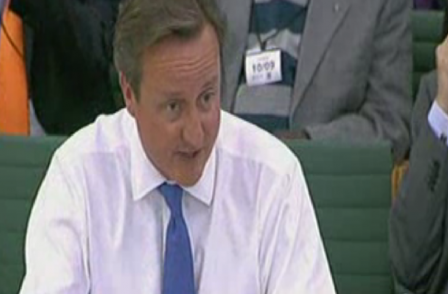
Prime minister David Cameron has reaffirmed his support for Parliament's statute-backed press regulation scheme and said he sees no solution in sight to the current ‘impasse’ over press regulation.
The majority of publishers have rejected Parliament’s blueprint for press regulation and instead are on the brink of signing up to a body called the Independent Press Standards Organisation.
As it stands, that body would not meet the criteria to gain official recognition under the Parliament-back press regulation Royal Charter. Instead, it fits in with a rival Royal Charter submitted by publishers’ body Pressbof to the Privy Council.
Speaking to the Commons Liaison Committee last night David Cameron said: “At the moment we are stuck. I am committed to the cross-party Royal Charter.”
Both Royal Charters are set to go the Privy Council for consideration next month. Cameron said: “I would expect the cross-party charter to be adopted.”
This raises the prospect that the IPSO press regulator will not have official recognition and so not insulate members from the threat of exemplary damages in libel actions under the Crime and Courts Act 2013.
This would remove the key incentive for signing up to the new regulator, which is expected to cost the publishing industry twice as much to fund as the current Press Complaints Commission.
Cameron said that the key shortcomings of the current IPSO press regulation plan centre around independence (on appointments and funding) and the provision of a libel arbitration service (which is optional under IPSO). Meanwhile, publishers object to the fact that Parliament's Royal Charter would be underpinned by legislation which means it can only be changed in future with a two-thirds majority of both Houses of Parliament.
Cameron said: "I think the press charter has something to recommend it, but it is deficient in some key respects and I think that is a problem.
"I remain committed to the cross-party charter, but I want to make the point that some progress has been made because the press have started the process of setting up their regulator. I hope they set it up in a way that is consistent with seeking recognition from the recognition body that will be established, but that's up to them.
"Some progress has been made, but I agree that it's slow and that's frustrating, but we have to follow the right processes."
On the establishment of IPSO, he said: "Obviously, it's disappointing that the press at the moment are saying they want nothing to do with the cross-party charter. Actually, when you look at the differences between the press charter and the cross-party charter, they are not massive.
"I hope that everyone will see sense and will find a way of having a charter that is in tune with Leveson and that the press can work with, but we are not there at the moment."
He added: "If the press decide to set up their regulator but not seek recognition, we won't have completed the job.
"That will be very frustrating because I really believe that the combination of a Royal Charter and a press self-regulatory body that seeks recognition from that charter, and so puts in place what Leveson had in mind, would be a really good outcome.
"We won't have crossed the Rubicon of legislation but we will have done right by the victims that Leveson rightly spoke up for.
“What is frustrating is that we are so nearly there, but we do have this impasse that the press charter does have problems with it, but the press won't take part in the cross-party charter.
"I think the Government has to make best endeavours to put the all-party charter into place and see whether a resolution can be found."
Cameron added: "Is it impossible to get to a situation where a decent charter is put in place and the press comply with it? No, it's not impossible. That's what we've got to shoot for."
Campaign group Hacked Off said: "We welcome the Prime Minister's reiteration of support for the cross-party Royal Charter and his acknowledgment that the draft put forward by sections of the press is deficient in key respects.
"Victims agree with Lord Justice Leveson that if some sections of the press do not join the system immediately this is not an impasse but merely the trigger for the planned incentives and penalties to take effect."
Cameron added: "Is it impossible to get to a situation where a decent charter is put in place and the press comply with it? No, it's not impossible. That's what we've got to shoot for."
Email pged@pressgazette.co.uk to point out mistakes, provide story tips or send in a letter for publication on our "Letters Page" blog
